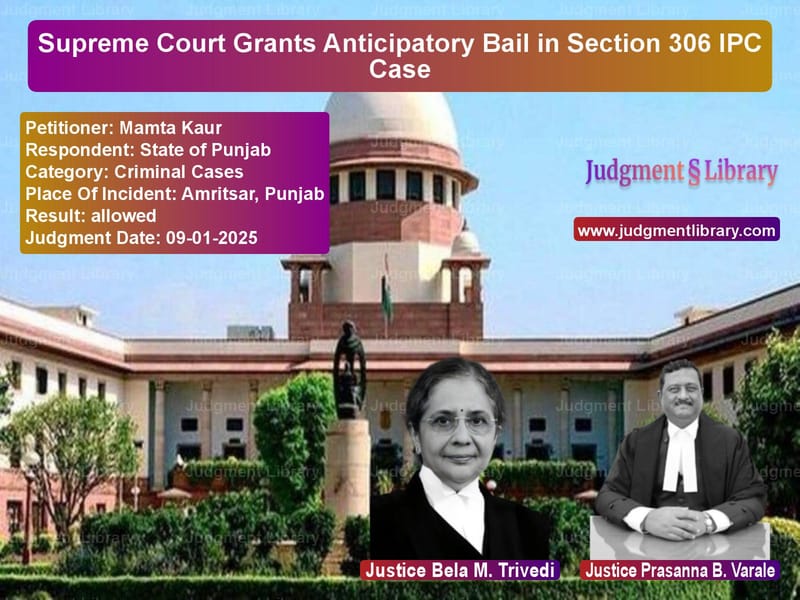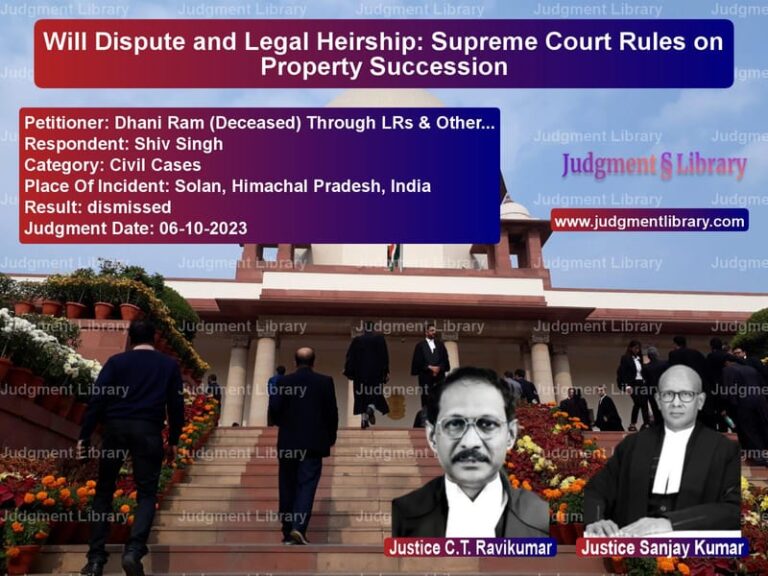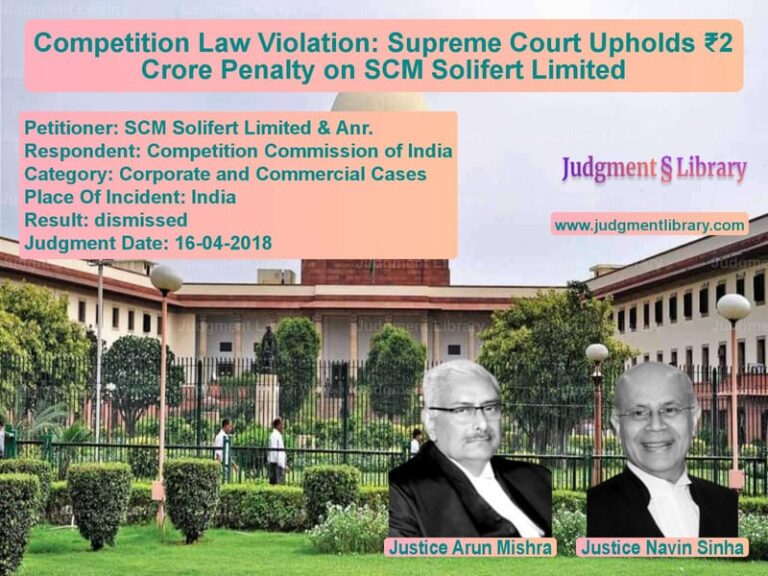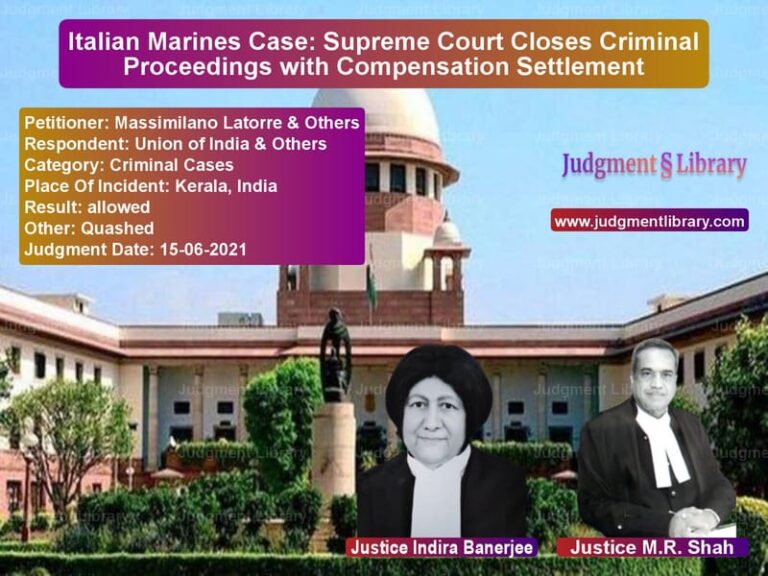Supreme Court Grants Anticipatory Bail in Section 306 IPC Case
The Supreme Court of India, in its judgment in Mamta Kaur vs. State of Punjab, addressed the issue of anticipatory bail under Section 306 of the Indian Penal Code (IPC), 1860. The case revolved around allegations of abetment of suicide and the appellant’s plea for pre-arrest protection. The Court ultimately ruled in favor of the appellant, granting anticipatory bail on specific conditions.
Background of the Case
The case arose from an FIR No. 13 dated 14.02.2023, registered at Police Station-Gharinda, District-Amritsar, under Section 306 IPC. The appellant, Mamta Kaur, was accused of abetting the suicide of an individual. Following the filing of the FIR, she moved the Punjab and Haryana High Court seeking anticipatory bail.
However, the High Court of Punjab and Haryana, in its judgment dated April 17, 2023, rejected her plea for anticipatory bail, prompting her to approach the Supreme Court through Special Leave Petition (Crl.) No. 14647/2024.
Petitioner’s Arguments
The petitioner, represented by Advocate Nikhil Ghai, argued the following:
- The petitioner had no direct role in the incident leading to the alleged suicide.
- There was no concrete evidence linking her to any act of abetment.
- She had fully cooperated with the investigation.
- The police had already confirmed that custodial interrogation was not required.
- She had received a letter from the Investigating Officer stating that no further interrogation was needed.
Respondent’s Arguments
The respondent, represented by Advocate Baani Khanna, opposed the bail plea, stating:
- The FIR contained serious allegations under Section 306 IPC.
- The matter was still under investigation.
- Granting anticipatory bail at this stage could hinder the investigation process.
- While the Investigating Officer’s letter stated that custodial interrogation was not required, circumstances could change.
Observations of the Supreme Court
The Bench, comprising Justices Bela M. Trivedi and Prasanna B. Varale, reviewed the arguments and evidence presented. The Court noted:
“It is fairly submitted by the learned counsel appearing for the respondent-State of Punjab that pursuant to the order passed by this Court on 21.10.2024, the appellant has joined the investigation as and when called upon to do so and that she has received a letter from the Investigating Officer stating therein that no more custodial interrogation of the appellant is required in the case.”
Read also: https://judgmentlibrary.com/supreme-court-acquits-husband-in-1990-kolhapur-murder-case/
Key Findings
- The petitioner had cooperated with the investigation whenever required.
- The Investigating Officer confirmed that custodial interrogation was unnecessary.
- Granting anticipatory bail would not prejudice the ongoing investigation.
- The State could seek cancellation of bail if the petitioner violated any conditions imposed by the Trial Court.
Final Judgment
The Supreme Court ruled in favor of the petitioner, stating:
“In view of the above, we are inclined to accept the present appeal.”
The Court further directed:
“Hence, it is directed that in the event of the arrest of the appellant, in connection with the case FIR No. 13 dated 14.02.2023, registered at Police Station-Gharinda, District-Amritsar, she shall be released on bail, if not required in any other case, on such terms and conditions that may be imposed or deemed fit by the Trial Court.”
Conditions for Bail
While granting anticipatory bail, the Supreme Court imposed the following conditions:
- The petitioner must not tamper with evidence or attempt to influence witnesses.
- The petitioner must cooperate with the investigation as and when required.
- The State of Punjab retains the right to seek cancellation of bail if any condition is breached.
Impact of the Judgment
The ruling reinforces the principles of anticipatory bail, particularly in cases where:
- The accused has cooperated with the investigation.
- Custodial interrogation is deemed unnecessary.
- There is no risk of evidence tampering or witness intimidation.
This judgment sets a precedent that anticipatory bail should be granted in cases where the prosecution cannot establish an immediate need for custodial detention.
Conclusion
The case of Mamta Kaur vs. State of Punjab highlights the importance of judicial scrutiny in anticipatory bail cases under Section 306 IPC. The Supreme Court’s ruling ensures that an accused person is not subjected to unnecessary arrest when they have cooperated with the investigation and there is no evidence suggesting further custodial interrogation is needed.
The judgment reaffirms the constitutional principle that bail, not jail, should be the rule in cases where there is no compelling reason for pre-trial detention.
Petitioner Name: Mamta Kaur.Respondent Name: State of Punjab.Judgment By: Justice Bela M. Trivedi, Justice Prasanna B. Varale.Place Of Incident: Amritsar, Punjab.Judgment Date: 09-01-2025.
Don’t miss out on the full details! Download the complete judgment in PDF format below and gain valuable insights instantly!
Download Judgment: mamta-kaur-vs-state-of-punjab-supreme-court-of-india-judgment-dated-09-01-2025.pdf
Directly Download Judgment: Directly download this Judgment
See all petitions in Bail and Anticipatory Bail
See all petitions in Suicide Cases
See all petitions in Extortion and Blackmail
See all petitions in Fraud and Forgery
See all petitions in Custodial Deaths and Police Misconduct
See all petitions in Judgment by Bela M. Trivedi
See all petitions in Judgment by Prasanna Bhalachandra Varale
See all petitions in allowed
See all petitions in supreme court of India judgments January 2025
See all petitions in 2025 judgments
See all posts in Criminal Cases Category
See all allowed petitions in Criminal Cases Category
See all Dismissed petitions in Criminal Cases Category
See all partially allowed petitions in Criminal Cases Category







